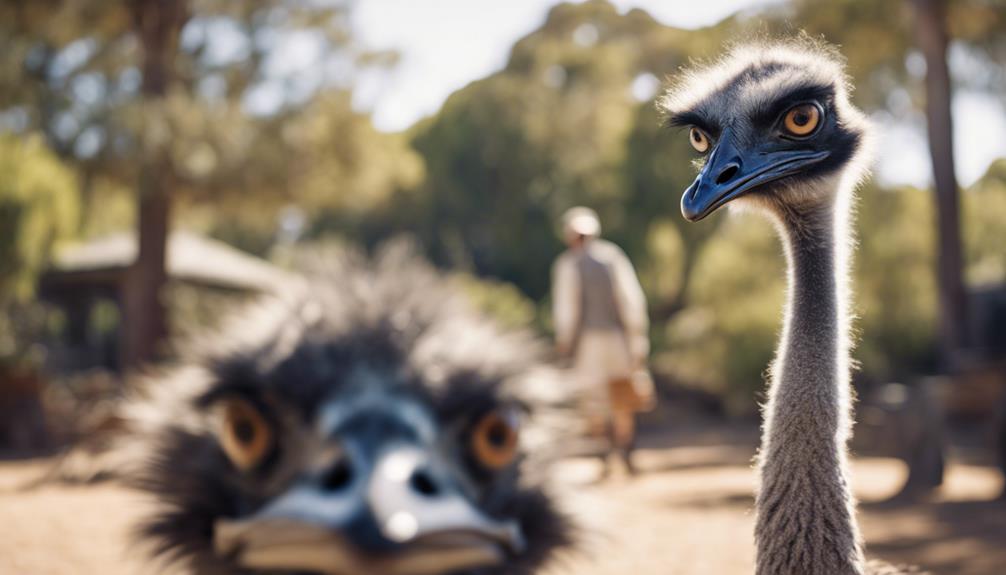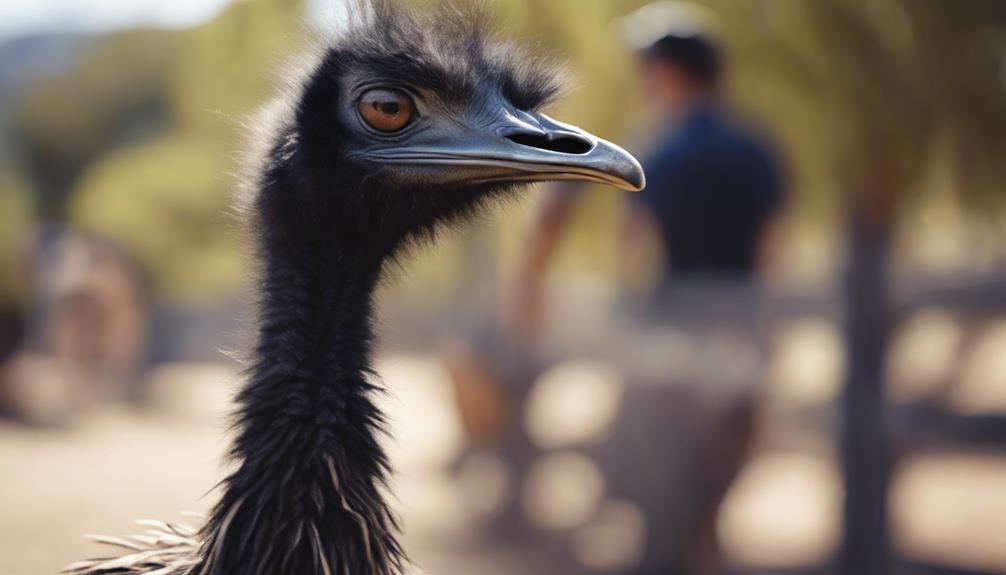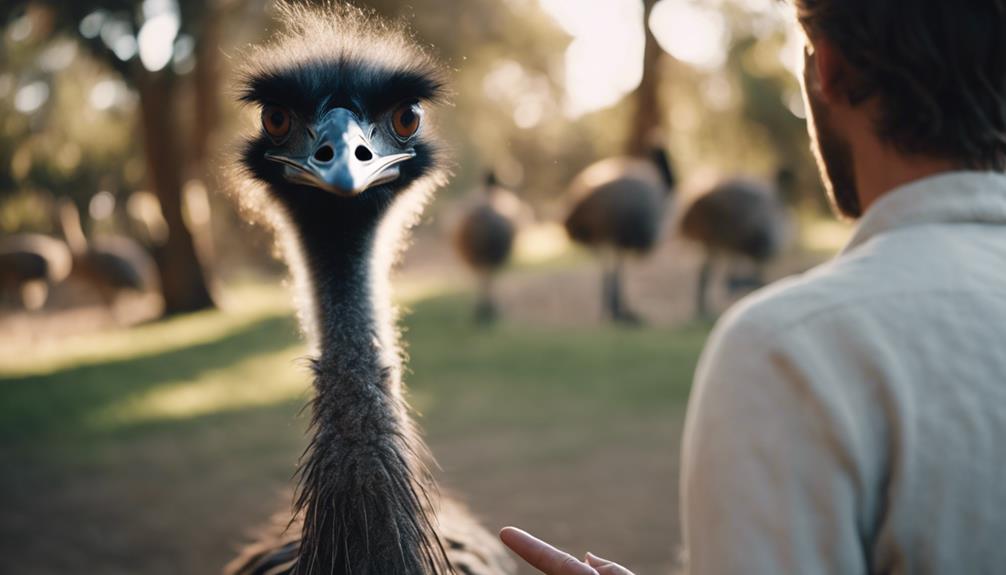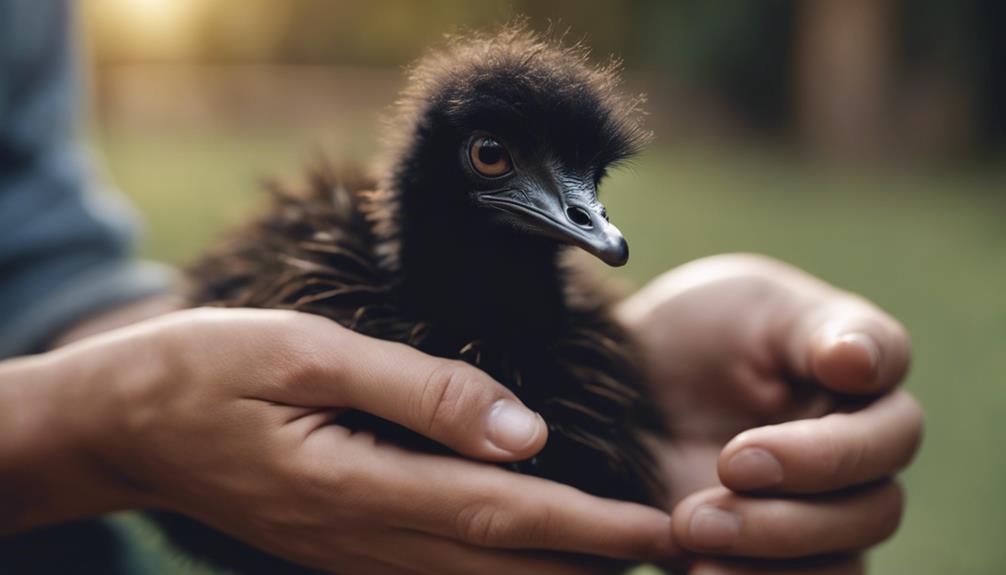
To prevent Emu aggression, it's essential to understand their behavior triggers and adopt proactive measures. By recognizing signs of distress, setting clear boundaries, and providing appropriate care, you can create a harmonious environment. However, there's a crucial aspect often overlooked that can significantly impact Emu behavior. This element can be a game-changer in fostering positive interactions and preventing aggressive tendencies.
Key Takeaways
- Respect emus' boundaries to avoid aggression.
- Observe and understand emu body language cues.
- Provide ample space and diverse environment.
- Avoid sudden movements and maintain calm demeanor.
- Seek professional help for aggressive emus.
Emu Aggression Triggers

To understand emu aggression triggers, observe their behavior patterns and environmental interactions closely. Emus are highly territorial birds, and their aggression is often triggered by perceived threats to their territory or young. Any encroachment upon their space, whether by humans or other animals, can lead to aggressive behavior. Additionally, emus may become aggressive during mating season when competition for mates is fierce. Understanding these triggers can help you prevent potential confrontations with emus.
Emus are known to display aggressive behavior when they feel cornered or trapped. In such situations, they may resort to kicking, pecking, or charging as a means of defense. It's essential to give emus space and avoid approaching them in a way that makes them feel threatened. By respecting their boundaries and observing their body language for signs of distress, you can minimize the risk of triggering their aggression.
Understanding Emu Body Language
Emu body language provides crucial insights into their emotional state and can help you anticipate potential aggressive behavior triggers. Understanding these signals is essential for maintaining control in your interactions with emus.
When an emu feels threatened or agitated, it may exhibit signs such as puffing up its feathers, lowering its head, or emitting low, rumbling sounds. These behaviors indicate that the emu is becoming defensive and may escalate to aggression if the perceived threat persists.
On the other hand, a relaxed emu will display open body posture, with feathers lying flat, and may even approach you in a non-threatening manner. By paying close attention to these cues, you can adjust your own behavior to prevent confrontations and maintain a sense of authority in your interactions with emus.
Establishing Boundaries With Emus

Understanding and enforcing clear boundaries is essential when interacting with emus to prevent potential confrontations and ensure safe and respectful engagements.
Emus are territorial animals and can become aggressive if they feel their space is being invaded. To establish boundaries effectively, you must first observe the emu's body language and reactions to determine their comfort levels. If an emu displays signs of discomfort or aggression, such as hissing, raising its feathers, or pacing, it's crucial to give it space and respect its boundaries.
When approaching an emu, move slowly and avoid sudden movements that could startle or provoke it. Maintain a safe distance and never try to touch or corner the bird. By setting clear boundaries and respecting the emu's space, you can minimize the risk of aggression and create a safer environment for both yourself and the bird.
Providing Adequate Space for Emus
Establishing ample space for emus to roam is crucial for their well-being and minimizing potential aggression. Emus are large, flightless birds that require significant space to exhibit natural behaviors and reduce stress levels. Inadequate space can lead to territorial disputes, aggressive behavior, and even physical harm to both emus and handlers.
When providing space for emus, ensure that each bird has access to a sufficient area for grazing, nesting, and social interaction. Emus are social animals that thrive in groups, but overcrowding can lead to heightened aggression. A minimum of 100 square feet per emu is recommended to prevent territorial conflicts and promote overall well-being.
In addition to physical space, consider the layout of the enclosure. Emus are fast runners and can become agitated if confined to small or narrow spaces. Providing a diverse environment with open areas for running, bushes for hiding, and shelter for resting can help prevent stress-induced aggression.
Avoiding Sudden Movements

To minimize the risk of triggering aggressive behavior in emus, it's important to move slowly and avoid sudden movements around these flightless birds. Emus, known for their strength and speed, can perceive sudden movements as threats, potentially leading to defensive or aggressive responses. When in the presence of emus, maintain a calm demeanor and refrain from making quick gestures or loud noises that could startle them.
Approach emus cautiously, giving them space and time to observe you. Abrupt actions may be interpreted as confrontational, prompting defensive behavior from the emus. By moving deliberately and predictably, you can establish trust and reduce the likelihood of provoking aggression in these birds. Remember, emus rely on their acute senses to detect changes in their environment, making them particularly sensitive to sudden movements.
Proper Feeding Practices for Emus
When feeding emus, it's essential to provide a balanced diet that meets their nutritional needs to ensure their health and well-being. Emus are herbivores and should primarily be fed a diet rich in fruits, vegetables, grains, and leafy greens. High-quality emu feed that's specifically formulated for their dietary requirements can also be beneficial. It's crucial to avoid feeding them foods high in salt, sugar, or fats, as these can lead to health issues such as obesity and digestive problems.
Additionally, emus require access to fresh, clean water at all times. Proper hydration is vital for their overall health and can help prevent various health issues. Make sure to regularly clean and refill their water containers to ensure they have an adequate supply.
Consulting with a veterinarian or a knowledgeable professional can help you create a suitable feeding plan for your emus. By following proper feeding practices and providing a well-rounded diet, you can contribute to keeping your emus healthy and happy.
Socializing Emus Appropriately

Proper socialization techniques are crucial for ensuring the well-being and behavior of emus in captivity. Emus are social birds that thrive on interaction, and inadequate socialization can lead to stress and aggression. To help you effectively socialize your emus, consider the following key strategies:
| Socialization Technique | Description |
|---|---|
| Controlled Introductions | Introduce emus to each other gradually, in a neutral space, to prevent territorial disputes. |
| Mimicking Natural Behaviors | Encourage social interactions by providing opportunities for grooming, foraging, and communal roosting. |
| Monitoring Body Language | Observe emus for signs of aggression, such as raised feathers or pecking, and intervene to prevent conflicts. |
Emu Enrichment Activities
For optimal well-being and mental stimulation, engaging emus in a variety of enrichment activities is key. Emus are intelligent creatures that require mental and physical challenges to prevent boredom and aggression. Providing opportunities for natural behaviors like foraging can help keep them stimulated and content. Scatter food in different areas to encourage their natural scavenging instincts. Additionally, introducing novel objects such as hanging mirrors or brightly colored toys can pique their curiosity and provide mental enrichment.
Emus also benefit from physical activities that mimic their natural behaviors. Creating obstacles for them to navigate, like low hurdles or logs, can stimulate their problem-solving skills and keep them physically active. Enclosures should be spacious to allow emus to move around freely and engage in activities like running and stretching their wings.
Handling Emu Chicks Safely

Handling emu chicks safely involves understanding their fragile bodies and developing gentle yet secure techniques for interaction. Emu chicks are delicate creatures and must be handled with care to ensure their well-being. When picking up an emu chick, gently scoop it up with both hands, supporting its body underneath to prevent any unnecessary stress on its bones. Avoid grabbing or squeezing the chick, as this can cause injuries. Emu chicks should be held close to your body to provide them with a sense of security.
When interacting with emu chicks, it's essential to approach them calmly and quietly. Sudden movements or loud noises can startle them, leading to potential distress. Allow the chicks to come to you at their own pace, rather than forcing interactions. Remember to wash your hands before and after handling emu chicks to prevent the spread of germs.
Emu Aggression Management Techniques
To effectively manage emu aggression, it's important to understand the triggers and cues that may lead to aggressive behavior in these birds. Emus, like many animals, display aggression when they feel threatened or stressed. Here are some techniques you can use to manage emu aggression effectively:
- Establish Dominance: Show confidence and assertiveness when interacting with emus to establish yourself as the leader.
- Provide Adequate Space: Ensure emus have enough space in their environment to prevent feelings of confinement, which can trigger aggression.
- Avoid Sudden Movements: Emus can be startled easily, so try to move slowly and avoid sudden gestures that may provoke a defensive response.
- Use Positive Reinforcement: Rewarding calm and non-aggressive behavior with treats or praise can help in shaping desirable behavior.
Seeking Professional Help if Necessary

Consider consulting with a certified animal behavior specialist if you encounter difficulties in managing emu aggression effectively. These professionals have the expertise and experience to assess the underlying causes of aggression in emus and develop tailored intervention strategies. By seeking their help, you can gain valuable insights into the behavior of emus, enabling you to address aggression more effectively.
Certified animal behavior specialists can conduct thorough assessments of your emus' environment, social dynamics, and individual behaviors to identify triggers for aggression. They can then provide you with evidence-based recommendations on how to modify these triggers and promote positive interactions with your emus. Additionally, these specialists can offer guidance on implementing behavior modification techniques and training methods that align with best practices in animal welfare.
Promoting Positive Interactions With Emus
To foster positive interactions with emus, establish a consistent routine for feeding and handling them. Emus, like many animals, respond well to predictability and structure. Here are some tips to help you promote positive interactions with these fascinating creatures:
- Maintain a regular feeding schedule: Emus thrive on routine, so try to feed them at the same times each day to create a sense of stability and trust.
- Use positive reinforcement: Reward good behavior with treats or praise to encourage desirable interactions and discourage aggression.
- Handle emus gently and calmly: Approach them in a relaxed manner and avoid sudden movements to prevent stress or fear responses.
- Provide enrichment activities: Keep emus mentally stimulated by offering toys, puzzles, or opportunities for exploration to prevent boredom and reduce the likelihood of aggressive behavior.
Frequently Asked Questions
Can Emus Be Trained to Perform Tricks or Tasks?
Yes, emus can be trained to perform tricks or tasks. By utilizing positive reinforcement techniques and consistent training, emus can learn behaviors such as targeting, fetching, and even simple tricks like turning around or bowing.
Do Emus Have a Specific Hierarchy Within Their Group?
Emus establish a social hierarchy based on dominance and pecking order within their groups. Understanding this structure can help you navigate interactions with these birds and anticipate their behaviors more effectively.
Are There Specific Colors or Patterns That Trigger Emu Aggression?
Specific colors or patterns can trigger emu aggression. Bright colors, especially red, can provoke aggressive behavior in emus. Striped patterns may also agitate them. It's crucial to avoid wearing these colors or patterns around emus to prevent aggression.
Can Emus Be Kept as Indoor Pets?
You can keep emus as indoor pets with proper care and space. Emus require a large enclosed area, a balanced diet, and regular veterinary check-ups. Make sure to provide enrichment activities to keep them healthy and happy.
What Are the Common Health Issues That Emus May Face?
When caring for emus, be aware of potential health hazards like parasitic infections, pododermatitis, and vitamin deficiencies. Regular veterinary check-ups and a balanced diet with proper supplements can safeguard against these common maladies.
Conclusion
Congratulations on mastering the art of preventing Emu aggression! Remember, by understanding their triggers, body language, and needs, you can create a harmonious relationship with these magnificent creatures.
Keep up the great work in establishing boundaries, providing space, and promoting positive interactions.
And hey, if all else fails, just remember that seeking professional help is always an option. Emus may be tough cookies, but with your knowledge and skills, you've got this under control!




